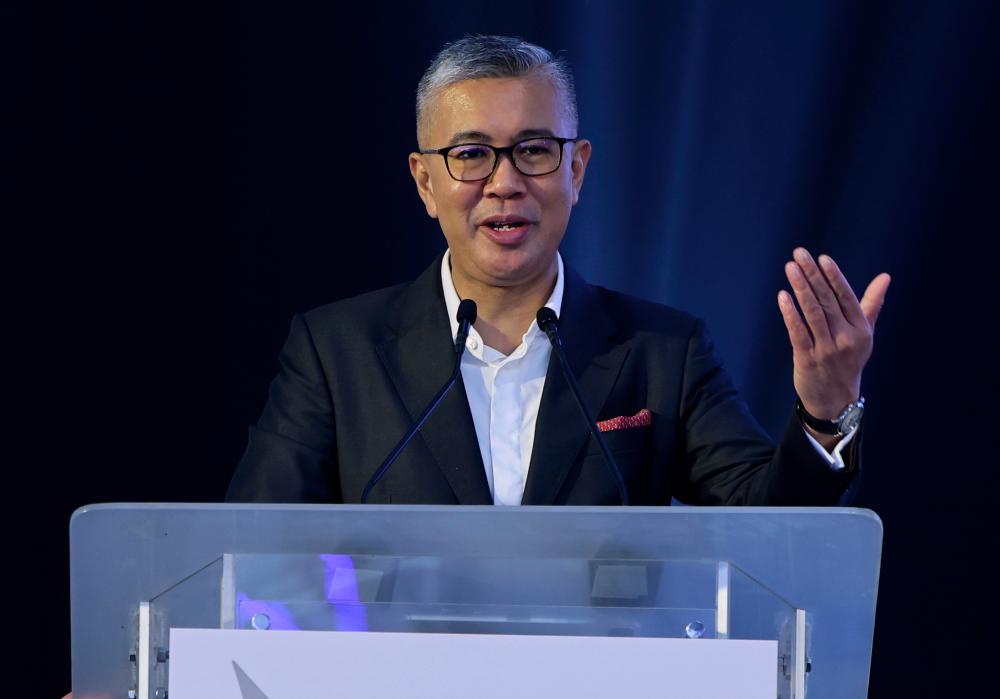VIENTIANE: ASEAN micro, small and medium enterprises (MSMEs) should benefit from the US$2 trillion expected economic value generated from the Digital Economy Framework Agreement (DEFA) by 2030.
Investment, Trade and Industry Minister Tengku Datuk Seri Zafrul Abdul Aziz said the DEFA negotiations launched last year are expected to conclude during Malaysia’s chairmanship in 2025.
According to the minister, ASEAN has laid the groundwork for digital transformation through the Bandar Seri Begawan Roadmap (BSBR), which aims to accelerate economic recovery and digital integration by 2025.
“A key milestone is the establishment of the DEFA, envisioned to harmonise regulations and create a more competitive regional trade ecosystem.
“This agreement is pivotal in transforming ASEAN into a digitally resilient and integrated region,“ said Tengku Zafrul during the World Bank Forum’s special reception at the ASEAN Summit 2024: Enabling ASEAN’s Digital Future held here, tonight.
Closing the digital divide among member countries
He also emphasised the need for ASEAN to address the policy and regulatory gaps among its member states to bridge the digital divide that persists among the member nations.
He said closing the gap will be essential for a truly inclusive regional digital future and in tapping ASEAN’s digital economy, projected to reach US$1 trillion by 2030.
However, he said to fully realise the digital future’s potential, ASEAN must address both opportunities and challenges, particularly the digital divide among ASEAN member states. For example, the Internet penetration rate in Singapore and Malaysia is over 90 per cent while Myanmar and Laos’ are closer to 50-60 per cent.
“The adoption of digital technologies has the potential to accelerate growth by as much as 8-10 per cent annually across member states.
“To fully capitalise on this, we need cohesive and well-coordinated digital policies that attract the right investments and foster innovation while ensuring equitable access to technology for all,“ said Tengku Zafrul, who arrived in Vientiane on Oct 6 to attend the 44th and 45th ASEAN Summits, which runs until Oct 11.
He said ASEAN’s collective economic strength, with a population base of 680 million and gross domestic product (GDP) of US$3.8 trillion in 2023, is significant, making the regional bloc the fifth-largest globally.
He said by 2030, ASEAN is expected to become the fourth-largest economy, driven by a population of over 717 million, with a large proportion of digitally-savvy youth. Digital adoption in ASEAN is growing rapidly, with over 400 million current internet users in the region.
“This makes us an attractive market to attract foreign direct investments (FDIs), fostering entrepreneurship and technology transfer, which can accelerate economic growth.
Enhancing digital trade
He said Malaysia is aggressively pushing to enhance digital trade, especially to improve MSME’s participation, and increase the value in the supply chain that supports digital trade, such as logistics.
The digital economy, especially digital trade, must generate sustainable positive spillovers to local markets, he added.
As for ASEAN, he said the grouping is the fastest-growing Internet market. With 125,000 new users on the Internet daily, ASEAN’s digital economy is projected to grow significantly, adding an estimated $1 trillion to regional GDP over the next 10 years.
Many roadblocks, nevertheless, stand in the way of realising this potential.
“ASEAN has laid out important policy measures and frameworks, including the AEC Blueprint 2025, Masterplan on ASEAN Connectivity 2025, and the e-ASEAN Framework Agreement, to address these roadblocks.
“ASEAN has also laid the groundwork for digital transformation through the Bandar Seri Begawan Roadmap (BSBR), which aims to accelerate economic recovery and digital integration by 2025.
Role of MSMEs
On another note, he said fostering a conducive environment for start-ups and MSMEs is key to unleashing ASEAN’s digital economy’s full potential since MSMEs account for 97 per cent of all businesses and contribute significantly to employment.
“By empowering them with digital tools and access to capital, we can create a fertile ground for innovation, job creation, and regional growth,” said Tengku Zafrul.
However, increasing cybersecurity threats and data privacy issues are on the rise in the region, with the economic cost of cybercrime in ASEAN estimated to be over US$100 billion annually. This underscores the importance of robust data protection measures and the demand for more trusted digital systems.
Establishing strong cybersecurity policy/regulatory frameworks and fostering collaboration among governments and the private sector will ensure that people and businesses can engage and scale up in the digital economy confidently and securely, he added.
As Malaysia prepares to lead the economic pillar of ASEAN in 2025, he said the country will prioritise two key deliverables, the ASEAN DEFA and initiatives related to artificial intelligence.
“These initiatives will underscore our commitment to building a digitally resilient ASEAN, aligning with global demands and technological advancements,“ said Tengku Zafrul.
Prime Minister Datuk Seri Anwar Ibrahim is expected to join the summit, alongside other ASEAN leaders and dialogue partners.
Laos will officially hand over the chairmanship to Malaysia in the 44th and 45th ASEAN Summits and Related Summits closing ceremony. Malaysia will assume the ASEAN chair on Jan 1, 2025.









